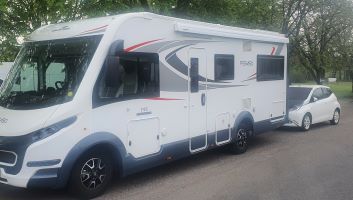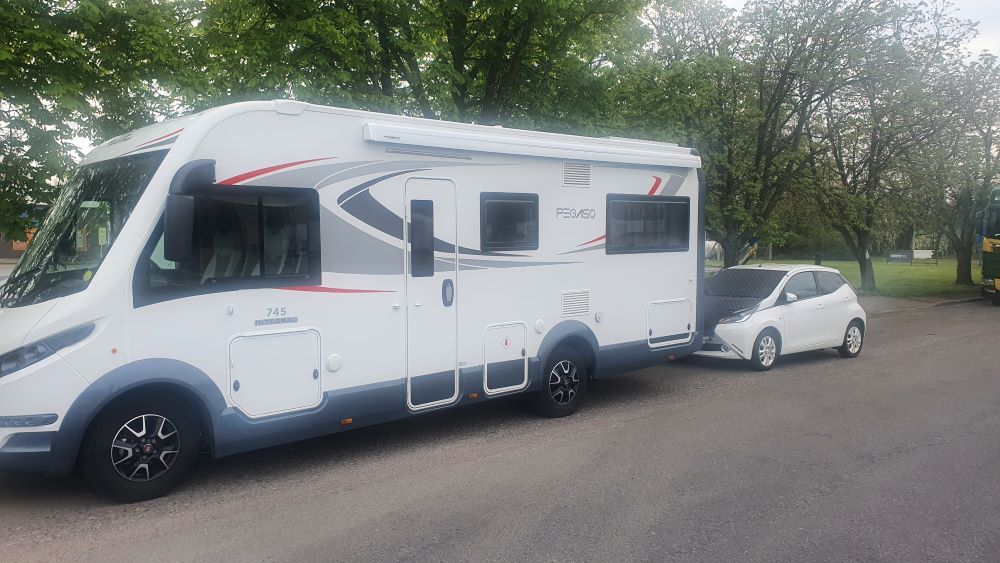
UK Towing Law for trailers & Caravans
WHAT YOU NEED TO KNOW
WHAT YOU NEED TO KNOW
Before embarking on a journey with a trailer or caravan attached to your vehicle, it's essential to familiarize yourself with the legal obligations. The UK towing regulations underwent revisions on December 16, 2021. Therefore, regardless of your experience as a caravaner, it's crucial to understand the implications of these updates on your travels
This comprehensive guide provides all the essential information you require, ranging from driving license prerequisites to the maximum permissible towing weights and dimensions. Additionally, it offers valuable tips aimed at ensuring the safety of both yourself and fellow road users.
Do I need a towing licence?
As of December 16, 2021, towing laws in the UK have undergone significant changes. If you plan to tow a horsebox, caravan, trailer, or boat behind your car, you'll need a full driving license. However, there's no longer a requirement for an additional towing license, provided the trailer's maximum authorized mass (MAM) doesn't exceed 3,500kg.
For those who obtained their driving license before January 1, 1997, the allowance has always been to drive a vehicle and trailer with a combined maximum weight of 8,250kg.
On the other hand, if your driving test was completed on or after January 1, 1997, an additional car and trailer driving test were previously necessary to tow heavier caravans or trailers. With the recent changes to towing laws, effective December 16, 2021, you're now permitted to tow trailers with a MAM of up to 3,500kg (up from 750kg MAM), and mandatory car and trailer driving tests have been discontinued.
Previously, licenses issued between January 1, 1997, and January 18, 2013, allowed for a maximum of 4,250kg for the vehicle and trailer, provided the trailer weighed no more than 750kg. If the trailer exceeded 750kg but did not surpass the unladen weight of the towing vehicle, a 3,500kg MAM for the trailer and towing vehicle was applied.
From January 19, 2013, until December 15, 2021, licenses were subjected to the same restrictions. However, when the trailer weighed more than 750kg, there was no longer a stipulation that it could not weigh more than the towing vehicle. Nonetheless, the maximum MAM for the towing vehicle and trailer remained at 3,500kg in this scenario.
What weight trailer or caravan can I tow?
Understanding the legal limits of towing weight is crucial, as attempting to hitch a sizable six-berth caravan to a compact hatchback is a recipe for disaster. To ascertain the maximum permissible towing weight for your specific vehicle, consult its handbook or the manufacturer's website, where you'll typically find this information. Look for figures such as maximum allowable trailer weight or Gross Vehicle Weight (GVW), which may also be listed as Gross Train Weight (GTW).
It's important to note that these weight limits encompass not only the vehicle and trailer but also account for passengers and luggage. While a standard driving license now permits towing trailers up to 3,500kg (MAM), trailers weighing over 750kg must still be equipped with brakes, regardless of the towing vehicle. Given that caravans typically range from around 1,000kg to over 2,500kg, they all necessitate braking systems.
For instance, the Vauxhall Corsa can tow up to 1,200kg, except for the base 75bhp 1.2-liter model, which is restricted to 500kg. However, even with this capacity, smaller two-berth caravans, when factoring in passengers and cargo, may approach or exceed the maximum allowable towing weight. Consequently, smaller hatchbacks and city cars are better suited for towing smaller trailers.
In contrast, the Nissan Qashqai SUV offers towing capacities ranging from 1040kg to 1800kg, depending on the engine and drivetrain configuration, making it suitable for heavier loads and larger caravans.
Moving up to a mid-sized luxury SUV like the BMW X3, towing capabilities extend to 2,000kg, with the 510bhp X3M Competition model boasting a slightly higher maximum of 2,400kg. This capacity comfortably accommodates large horseboxes or sizable caravans.
The Land Rover Discovery SUV stands out as one of the most adept tow vehicles available, boasting a towing capacity of up to 3,500kg. This capability encompasses a wide range of trailers, from horseboxes to mid-sized boats and the largest caravans on the market.
What size trailer or caravan can I tow?
A trailer must adhere to specific size constraints, typically not exceeding 7 meters in length and 2.55 meters in width. Should the trailer surpass the width of your car, mirror extenders are necessary. Determining the maximum height is somewhat nuanced; many sources advise against exceeding 1.7 times the trailer's track width. This measurement, the distance between the middle of the wheel treads, typically ranges around 3 meters.
For those needing to transport exceptionally tall items over short distances, it's important to note that most UK bridges provide a minimum clearance of 5 meters.
Tips for towing safely
To ensure a safe towing journey, it's essential to conduct several checks beforehand.
Firstly, determine the maximum towing weight capacity of your specific vehicle. This information can typically be found in the owner's manual, handbook, or on the manufacturer's website.
When towing, adhere to the designated speed limits: 60mph on dual carriageways and motorways, and 50mph on other road types, unless otherwise specified.
If the item being towed exceeds the width of the towing vehicle, install mirror extenders for improved visibility.
For optimal safety, experts advise that the trailer's mass should not exceed 85% of the vehicle's kerb weight, as surpassing this limit can compromise acceleration, braking, and maneuverability.
Reversing with a trailer or caravan requires practice and skill; consider practicing this maneuver before beginning your journey.
Ensure that any trailer weighing over 750kg is equipped with its own braking system, and all trailers must display the same number plate as the towing vehicle.
Lastly, ensure that any towbar fitted to the vehicle complies with EU regulations and is suitable for use with the tow vehicle.
Towing rules FAQs
Can electric cars tow a caravan or trailer?
Yes, indeed. Several electric vehicles (EVs) on the market are suitable for towing. Their instant torque delivery efficiently handles heavy loads. However, it's important to note that towing may affect the electric range, so it's advisable to have access to charging stations along your route.
Here's what you need to know about EVs and towing: Electric SUVs like the Tesla Model X and BMW iX boast impressive towing capacities, with the ability to tow 2,250kg and 2,500kg respectively. Even smaller models like the Kia EV6 and Hyundai Ioniq 5 can tow up to 1,600kg.
Can I tow a caravan or trailer on my licence?
Yes. The recent rule changes mean that anyone with a full driver’s licence is now allowed to tow a trailer or caravan up to a maximum authorised mass (MAM) of 3,500kg. The previous towing limit for those who completed their driving licence after 1 January 1997 was 750kg.
Is there an age limit for towing a caravan or trailer?
To tow a caravan or trailer, you must be at least 18 years old. Although no longer a legal requirement, it's strongly advised to undergo a towing course to gain familiarity with how the vehicle and trailer interact while on the road.
What’s the speed limit for towing a caravan or trailer?
You can travel at a maximum speed of 60mph on dual carriageways and motorways. On other roads, a maximum speed of 50mph is permitted unless a lower speed limit is specified.
Does car insurance cover towing a caravan or trailer?
Typically, comprehensive insurance policies cover towing, although some insurers may only provide third-party liability coverage. This means you're protected against injury to individuals or property, but the trailer or caravan itself may not be covered.
While insurance for your caravan isn't mandatory by law, it's advisable to contact your insurer for a quote to ensure coverage for potential damage or loss.
What is the best car to tow a caravan or trailer?



